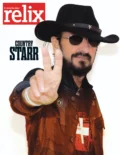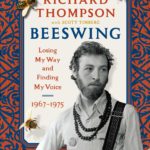Much like the music that’s been his life’s work, Richard Thompson’s life story is not what one would expect.
This isn’t a score-settling, sex, drugs and rock ‘n’ roll memoir. “Beeswing: Losing My Way and Finding My Voice 1967-1975” is instead a mostly happy recollection of enduring friendships, musical partnerships and religious faith.
As with his songwriting, Thompson, with assistance from Scott Timberg, is a thoughtful storyteller, giving readers just enough background about his childhood years before getting to the heart of the matter – Fairport Convention and beyond.
Thompson describes how the band got its name from the home where they convened to practice. There’s the matter of Graham Nash’s observing the group’s relative lack of success and writing “King Midas in Reverse” as a result. And there’s the night Fairport shared the stage with Led Zeppelin and as his bandmates filtered away, Thompson found himself alone performing with Robert Plant, Jimmy Page, John Paul Jones and John Bonham.
Thompson his band of English folkies also crossed paths with American rockers and once jammed with Jimi Hendrix. Later, Thompson apparently was asked to join the Eagles and Traffic, but he doesn’t remember the invitations specifically. Anyway, he wasn’t interested.
“The reality was that the last thing I wanted to do was join a band playing American styles,” he writes. “I felt I was on a mission, pioneering a new form of music, writing songs based on the tradition of the British Isles.”
Readers are taken through Fairport’s revolving door of membership and the bus crash that killed founding drummer Martin Lamble and Thompson’s girlfriend and nearly derailed the group. And though Thompson quit the band in 1971, he continued living with them and remains friendly with its members to this day.
Thompson is complimentary of all his former compatriots, particularly Sandy Denny, Dave Swarbrick, Dave Mattacks and Dave Pegg. The latter two even served as Thompson’s post-Fairport rhythm section for a time.
Thompson chronicles his music-making with and marriage to Linda Thompson, shedding light on their embrace of Sufism and their experience on the Haj. And though the book’s title suggests it ends in 1975, it continues through 1982, giving readers a bit of insight into the Thompsons’ doomed recording sessions with Gerry Rafferty and the end of their musical and marital partnership just as American college students were starting to dig their music and flock to their concerts.
Despite his previous protestations, Thompson now lives in New Jersey and his music, like his home base, is more Americanized than ever. Perhaps that evolution will be discussed in the follow-up book, which “Beeswing”’s subtitle – and introduction – seems to suggest is inevitable.
“Now it is time to think back,” he writes in the first paragraph. “The arrow is arcing through the air and speeding towards its appointed target.”



No Comments comments associated with this post